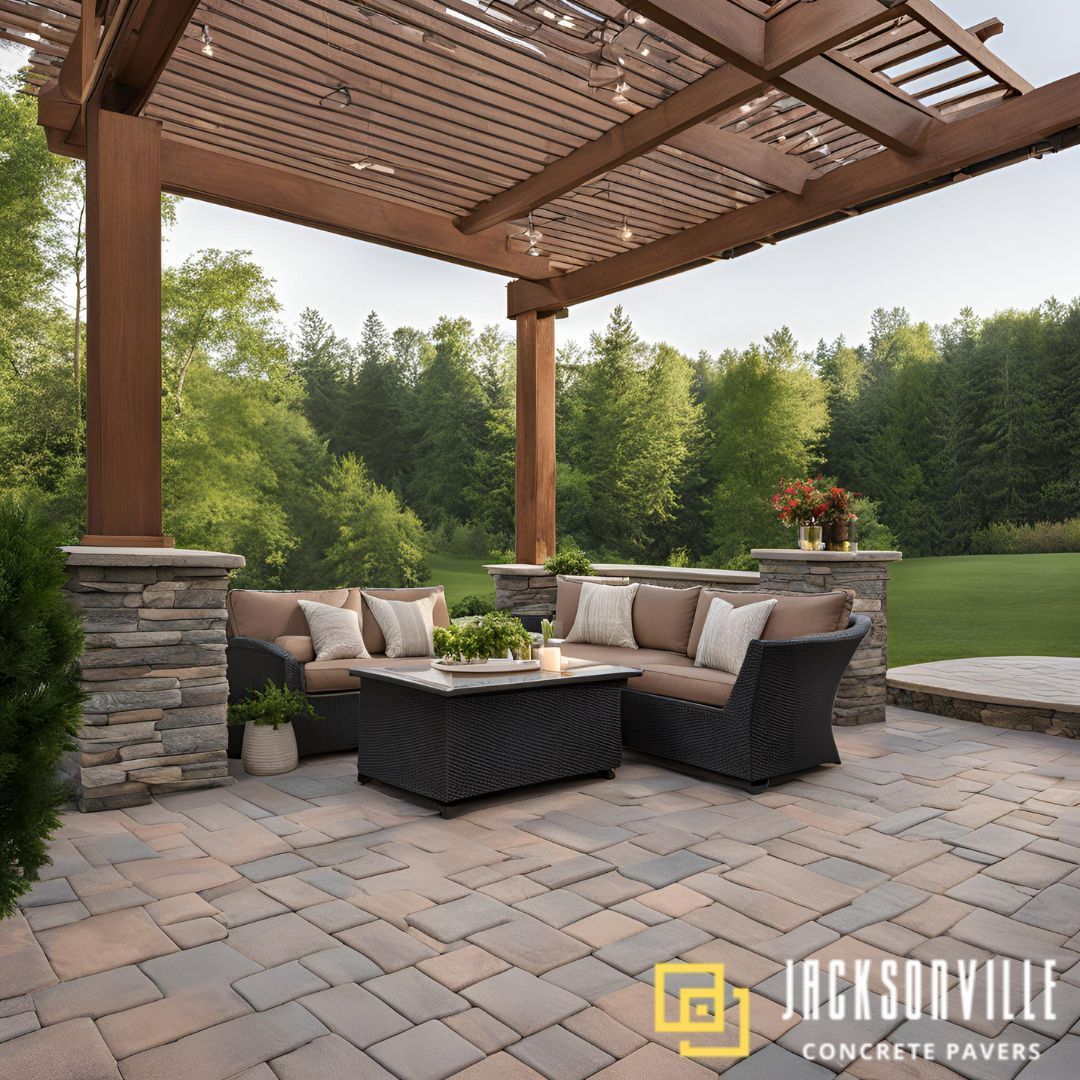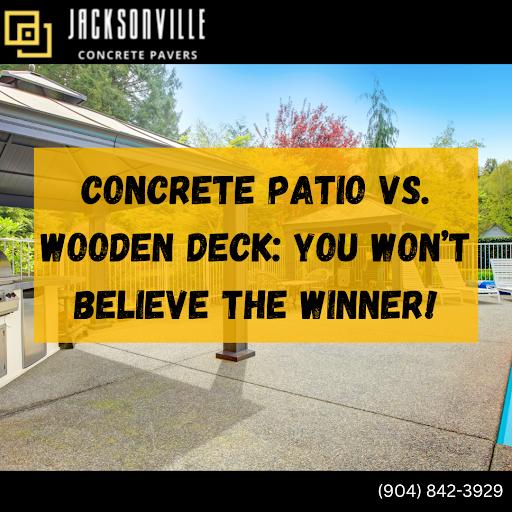Adding Concrete Pavers To Your Patio: Cost, Process, and Benefits
Concrete patio pavers have emerged as a favorite for homeowners looking to enhance their outdoor living spaces due to their versatility, durability, and aesthetic appeal. This guide will highlight the cost, professional installation process, and benefits of adding concrete pavers to your patio, ensuring you make an informed decision.
Cost of Adding Concrete Pavers to Your Patio
Understanding the cost breakdown is crucial for budgeting your paver patio project. Here’s a detailed look at the expenses involved:
Material Costs
- Concrete Pavers: The cost of concrete pavers ranges from $8 to $15 per square foot, depending on the quality and design you choose. Higher-end pavers with intricate designs and a variety of colors tend to be on the pricier side. These pavers are available in various textures and finishes, allowing you to achieve the perfect look for your patio.
- Base Materials: The foundation of your paver patio is critical. Base materials, including geotextile fabric, Class II road base, and bedding sand, cost between $1.40 to $2.20 per square foot. Proper base installation ensures the longevity and stability of your patio, preventing future issues such as sinking or shifting.
Labor Costs
Hiring professionals for paver installation is advisable to ensure quality and longevity. Labor costs typically range from $5 to $15 per square foot, influenced by the complexity of the design and the installer’s experience. On average, homeowners can expect to spend between $2,400 and $7,000 for a professional installation.
Additional Costs
- Design Complexity: Custom designs and patterns, especially those with curves or intricate layouts, can increase the overall cost per square foot. Unique designs require additional cutting and fitting, which can increase labor time and costs.
- Site Preparation: If your site requires significant grading or leveling, additional costs can range from $770 to $3,000. Proper site preparation is crucial to ensure a stable base for your pavers, preventing future problems like water pooling or uneven settling.
Professional Installation Process
Installing concrete pavers is a meticulous process that requires professional expertise to ensure a durable and visually appealing result. Here’s an overview of the steps involved:
1. Planning and Design
For the installation of residential pavers, professionals begin with a thorough consultation to understand the client's vision and requirements. We help you choose the perfect design, color, and layout that complements your home’s architecture. Using advanced design software, we provide a detailed visualization of the final project. This step ensures that every detail aligns with your expectations and the unique features of your outdoor project.
2. Site Preparation
To achieve your dream project of concrete paver patios, proper site preparation is crucial for its success. The designated area is cleared of any existing structures, plants, or debris. Our team marks the area precisely and ensures it is level, they will also call 811 to check for underground utilities - preventing any accidental damage during excavation. This thorough preparation minimizes the risk of future issues and sets the foundation for a long-lasting patio.
3. Excavation
Experts excavate the site to a depth that accommodates the thickness of the pavers, base materials, and bedding sand. This typically involves digging 6 to 8 inches below the final grade to ensure a stable foundation. Excavation depth is critical to accommodate the base and bedding materials, providing the necessary support for your outdoor patio.
4. Base Layer
A geotextile fabric is laid to prevent soil mixing and weed growth. A 4-6 inch layer of Class II road base is then added and compacted thoroughly using a plate compactor. This base layer is crucial for the stability and longevity of your paver patio. Compaction ensures that the base material is firm and level, preventing future settling or shifting of the pavers - which might heavily impact both the pavers and the overall outdoor design.
5. Bedding Sand
A 1-inch layer of coarse bedding sand (ASTM C-33) is spread over the compacted base. PVC pipes and a screed board are used to level the sand evenly, providing a smooth surface for laying the pavers. This step is vital for creating a flat, stable surface that supports the pavers and facilitates proper drainage.
6. Laying the Pavers
Starting from a fixed point, our professionals lay the pavers in the chosen pattern. Each paver is placed with precision, ensuring consistent spacing and alignment. A rubber mallet is used to set the pavers firmly in place. Proper alignment and spacing are crucial to achieving a uniform, visually appealing patio.
7. Concrete Paver Edging and Joint Sand
Edging or a concrete bond beam is installed, and joint polymeric sand is swept into the gaps between pavers. This sand hardens to prevent weed growth and enhances the stability of the patio. Edging provides a finished look and prevents the pavers from shifting, while the joint sand locks the pavers in place and prevents weed growth.
8. Compaction and Sealing
The final step ensures you have the perfect paver patio. It involves compacting the pavers to set the joint sand and ensure a level surface. A high-quality sealant is applied to protect the pavers from weathering and stains, enhancing their durability and appearance. Sealing not only ensures the long-lasting beauty of the pavers' color and texture but also makes them easier to clean and maintain.
Benefits of Concrete Pavers
Concrete pavers offer numerous advantages that make them the perfect choice for homeowners looking for the 'jack of all trades' out of the wide selection of pavers available. Here’s why you should consider them for your exterior space.
1. Durability
Concrete pavers are exceptionally durable and capable of withstanding heavy foot traffic and extreme weather conditions. They are resistant to cracking and can last up to 25 years with minimal maintenance. This durability ensures that your investment will stand the test of time, providing a reliable and attractive outdoor space for years to come.
2. Aesthetic Appeal
Available in a wide range of colors, shapes, and patterns, concrete pavers offer a visual appeal that has endless design possibilities. This versatility allows you to have endless concrete paver design ideas, giving you the ability to craft your patio to whatever you want. Whether you prefer a classic, contemporary, or rustic look, concrete pavers can be tailored to match your style and preferences.
3. Low Maintenance
Concrete pavers are easy to maintain. Regular sweeping and occasional pressure washing are usually sufficient to keep them looking new. The use of polymeric sand in the joints helps prevent weed growth and insect infestations. This low maintenance requirement means you can enjoy your patio with minimal effort, allowing you more time to relax and entertain.
4. Easy Repairs
One of the significant advantages of concrete pavers is their ease of repair. If a paver gets damaged, it can be replaced individually without disturbing the surrounding area, unlike poured concrete. This flexibility makes it easy to maintain the appearance and functionality of your patio without the need for extensive repairs.
5. Increased Home Value
For residential paver patios, having them well-designed can significantly increase your home’s value and curb appeal, making it more attractive to potential buyers. This added value can be a strong selling point if you decide to put your home on the market. Investing in a high-quality concrete paver patio can offer a substantial return on investment, both in terms of enjoyment and resale value.
Conclusion
Adding concrete pavers to your patio is the perfect paver choice that enhances both functionality and aesthetics. Although regarded as a costly option compared to other materials - the durability, low maintenance, and increase in home value make concrete pavers, or any other pavers for that matter - an excellent choice.
Jacksonville Concrete Pavers specializes in providing top-notch concrete paver installations tailored to client needs with the help of commercial-grade concrete pavers - that are sourced from reputable brands. We offer a free consultation, as well as a 3D rendering to ensure your patio project is what you envisioned. Lastly, we can process all the necessary permits, and adhere to local regulations and industry standards if the need should arise.
Frequently Asked Questions (FAQs)
1. Do concrete pavers increase home value?
Yes, adding a concrete paver patio or any other paved surface can enhance your home's value and curb appeal. This is because paver patios are visually appealing, durable, and low-maintenance, which are attractive features for potential buyers.
2. How long do concrete pavers last?
Concrete pavers can last up to 25 years with proper maintenance. Their longevity depends on the quality of installation, the materials used, and regular upkeep, such as cleaning and sealing.
3. Are concrete pavers more expensive than poured concrete?
Yes, pavers generally cost more upfront but are easier and cheaper to repair over time. While the initial installation cost of pavers is higher, their long-term maintenance costs are lower, making them a cost-effective choice in the long run.
4. Can I install concrete pavers myself?
Yes. However, while DIY installation is possible, hiring a professional ensures better quality and durability. Professional installers have the experience and tools necessary to ensure a stable, long-lasting patio, which can be challenging for DIYers to achieve.
5. How often do concrete pavers need to be sealed?
It’s advisable to seal concrete pavers every 2-3 years to maintain their appearance and durability. Sealing helps protect the pavers from stains, weather damage, and wear, keeping them looking new and extending their lifespan.
6. Do concrete paver patios require a lot of maintenance?
No. Concrete pavers are the perfect paver for the busy homeowner. They are low-maintenance, requiring regular sweeping and occasional pressure washing. Using polymeric sand in the joints helps prevent weed growth and insect infestations, reducing the need for frequent maintenance.
7. What if a paver gets damaged?
Both patio and driveway pavers can easily be replaced without redoing the entire area. This makes repairs straightforward and cost-effective, as you only need to replace the affected pavers rather than the entire patio.




